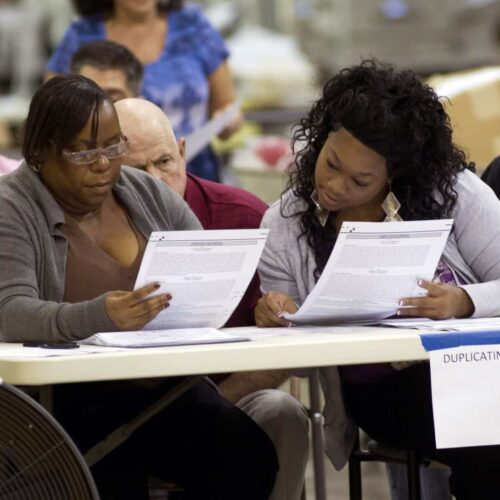Introduction
The American electoral system is maddeningly complex, decentralized, even counterintuitive. Some 8,000 jurisdictions administer elections at the local level, from rural counties with a few hundred voters, to urban ones with millions. They rely on an army of poorly paid, part-time employees — most of whom are older than 60 — to run polling stations. Voter registration lists often originate with paper-based systems prone to human error. Most election officials are also partisans, responsible not just to the electorate, but to their party’s interests. States set the rules, except when counties do. The result is a disjointed, crazy-quilt system, with inconsistent performance that often undermines faith in the process. That’s the bottom-line conclusion from this flurry of recent studies.
Presidential Commission on Election Administration Report
Appointed in 2013 by Barack Obama to identify best practices in election administration, the bipartisan commission held hearings with experts, officials and the public and drew together the best research on elections to compile a final report that identifies weaknesses in the nation’s voting system and proposes solutions.
Election Performance Index – Pew Charitable Trusts
Pew’s index measures each state’s performance using a broad range of indicators. An interactive allows users to track change over the past few elections.
Issues Related to State Voter ID Laws – Government Accountability Office
This 2014 study examined the implications of voter identification laws, reviewing rates of ID ownership among voters and examining the effect of identification laws on turnout.
Counting Votes 2012: A State-by-State Look at Voting Technology Preparedness – Verified Voting, Rutgers School of Law and Common Cause
This report looked at states’ voting system preparedness, using measures including a state’s audit procedures, the presence of a paper trail for all votes and back-up measures in the event of machine failures.
Report on Registration Systems in American Elections – Harvard and M.I.T.
Professors Stephen Ansolabehere and Charles Stewart provide an overview of the nation’s disjointed voter registration system, highlighting key policy questions and possible answers.
Waiting to Vote in 2012 – M.I.T.
Charles Stewart provides data on wait times at the polls in 2012 and analyzes the information both geographically and demographically. Among the conclusions: many places with the longest waits that year were also worst offenders in 2008.
How to Fix Long Lines – The Brennan Center for Justice
Lawrence Norden of the center’s Democracy Program draws on research about waits at the polls to argue for modernizing voter registration, expanding early voting and setting standards for polling place accessibility.
2008 & 2009 Ohio Elections Summit and Conference Final Report
Ohio’s then-Secretary of State Jennifer Brunner, a Democrat, asked Norden of the Brennan Center to chair a summit after the 2008 election to assess how the state could improve its elections, drawing together officials, academics, advocates and the public. The final report provides a list of issues that might be addressed through improved laws and administration. Some of those recommendations have been adopted, while others have not.
Additionally, the Presidential Commission has a more exhaustive list of research and resources here: https://www.supportthevoter.gov/materials-research/



Join the conversation
Show Comments